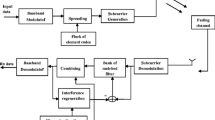Abstract
Broadband communication systems of the current generation are likely to offer higher bit rates for delivering high-speed multimedia services to the end users. The achievable capacity and data rate of wireless communication systems are limited to fading channels varying with time, leading to multiple access interference (MAI) and multipath interference (MPI). In this paper, we investigate downlink single-input multiple output transmission for complementary coded code-division multiple access (CC-CDMA) systems working in channels with multipath fading. Here, parallel interference cancellation is employed for analysis of CC-CDMA with different frequency domain equalization schemes to eliminate MPI and MAI over multipath fading channels. Error rate analysis for CC-CDMA employing receiver diversity is assessed using simulations under varying channel parameters. Further, we compare different equalization schemes to show the superiority of regularized zero forcing in reducing the error rate of CC-CDMA systems.










Similar content being viewed by others

References
Fazel, K., & Kaiser, S. (2008). Multicarrier and spread spectrum systems: From OFDM and MC-CDMA to LTE and WiMAX (2nd ed.). Chichester: John Wiley.
Hara, S., & Prasad, R. (1999). Design and performance of multicarrier CDMA systems in frequency-selective Rayleigh fading channels. IEEE Transactions on Vehicular Technology, 48(5), 1548–1595.
Eng, T., & Milstein, L. B. (1994). Comparison of hybrid FDMA/CDMA systems in frequency selective Rayleigh fading. IEEE Transactions on Selected areas in Communications, 12(5), 938–951.
Xu, W., & Milstein, L. B. (1997). Performance of multicarrier DS-CDMA systems in the presence of correlated fading. Proceedings of the Vehicular Technology Conference (VTC), 3, 2050–2054.
Xu, W., & Milstein, L. B. (2001). On the performance of multicarrier RAKE systems. IEEE Transactions on Communications, 49(10), 1812–1823.
Chen, H. H., Yeh, J. F., & Suehiro, N. A. (2001). A multicarrier CDMA architecture based on orthogonal complementary codes for new generations of wideband wireless communications. IEEE Communication Magazine, 39(10), 126–135.
Chen, H. H. (2007). The next generation CDMA technologies. Hoboken, NY: Wiley.
Chen, H. H., Chu, S. W., Kuroyanagi, N., & Vinck, A. J. H. (2007). An algebraic approach to generate a superset of perfect complementary codes for interference-free CDMA. Wireless Communications and Mobile Computing, 7(5), 605–622.
Magana, M. E., Rajatasereekul, T., Hank, D., & Chen, H. H. (2007). Design of MC-CDMA system that uses complete complementary orthogonal spreading codes. IEEE Transactions on Vehicular Technology, 56(5), 2976–2989.
Al-Fuhaidi, B., Hassan, H. E. A., & Salah, M. M. (2014). Interference cancellation with space diversity for downlink MC-CDMA systems. Wireless Personal Communications, 74(2), 439–456.
Bhaskar, V., & Khaleel, S. (2013). Performance analysis of Ranging process in diversity incorporated wireless system suffering from narrowband Jamming. Wireless Personal Communications, 72(4), 2633–2652.
Meng, W. X., Sun, S. Y., & Chen, H. H. (2013). Multiuser interference cancellation in complementary coded CDMA with diversity gain. IEEE Wireless Communication Letters, 2(3), 303–306.
Krikidis, I. A. (2005). Parallel interference cancellation for DS-CDMA downlink with low spreading factors. In IEEE workshop on signal processing systems design and implementation (pp. 669–704).
Gusmo, A., Diris, R., & Estenes, N. (2003). On the frequency domain equalization and diversity combining for broadband wireless communication. IEEE Communication Letters, 51(7), 1029–1033.
Zhu, X., & Murch, R. (2004). Layered space-frequency equalization in a single carrier MIMO system for frequency selective fading channels. IEEE Transactions on Communications, 3(3), 701–708.
AI-Fuhaidi, B. A., Hasan, H. E. A., Salah, M. M., & Alagooz, S. S. (2012). Parallel interference cancellation with different linear equalization and RAKE receiver for the downlink MC-CDMA systems. IET Communications, 6(15), 2351–2360.
Liu, Z., Guan, Y. L., & Chen, H. H. (2015). Fractional-delay Resilient receiver design for interference free MC-CDMA communication based on complete complementary codes. IEEE Transactions on Wireless Communications, 14(3), 1226–1236.
Chen, H. H., Zhang, H. M., & Huang, Z. K. (2012). Code hopping multiple access based on orthogonal complementary codes. IEEE Transactions on Vehicular Technology, 61(3), 1074–1083.
Takeda, K., & Adachi, F. (2007). Frequency-domain interchip interference cancellation for DS-CDMA downlink transmission. IEEE Transactions on Vehicular Technology, 56(3), 1286–1294.
Verdu, S. (1998). Multiuser detection. Cambridge: Cambridge University Press.
Author information
Authors and Affiliations
Corresponding author
Rights and permissions
About this article
Cite this article
Judson, D., Bhaskar, V. Error Rate Analysis of SIMO-CDMA with Complementary Codes Under Multipath Fading Channels. Wireless Pers Commun 98, 1663–1677 (2018). https://doi.org/10.1007/s11277-017-4938-0
Published:
Issue Date:
DOI: https://doi.org/10.1007/s11277-017-4938-0



